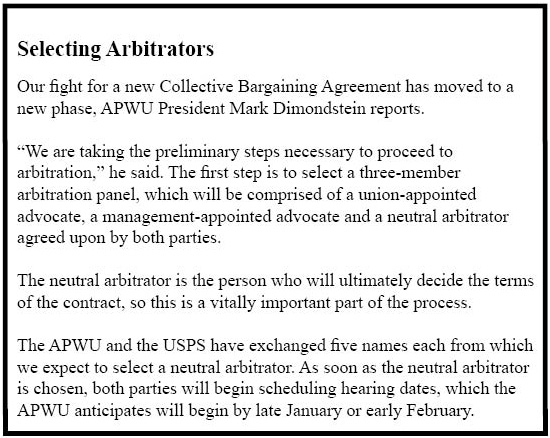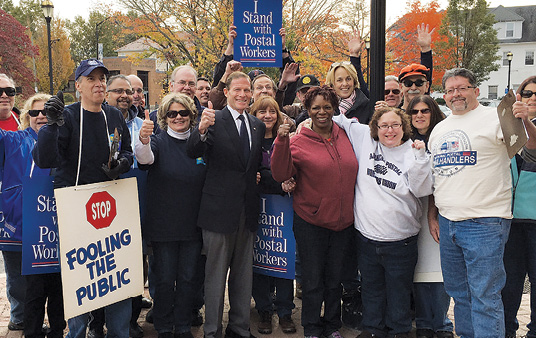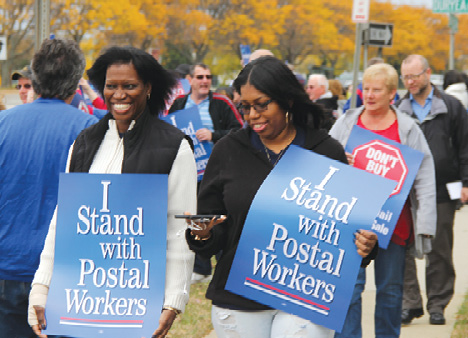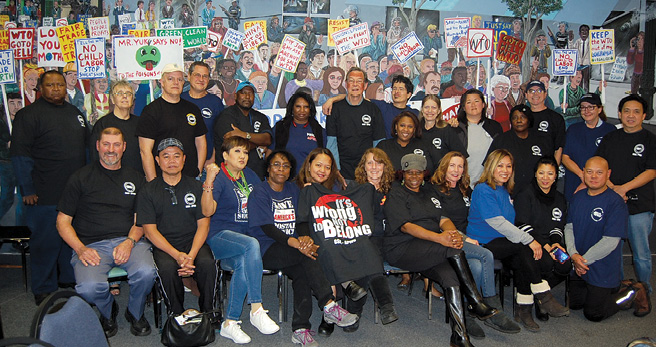Why We Don’t Have a New Contract Yet
January 1, 2016
(This article first appeared in the January-February 2016 issue of The American Postal Worker magazine.)
The question can be heard throughout the APWU: Why don’t we have a new contract yet?
Bargaining between the APWU and the Postal Service went well on non-economic issues, President Mark Dimondstein told participants in the union’s All-Craft Conference in Octob er, but “when we got to the economic discussions, things broke down,” he said.
er, but “when we got to the economic discussions, things broke down,” he said.
Major concessions were made in bargaining in 2010, Dimondstein said, so the union’s objective in this round of bargaining was “to stop the bleeding and turns things in a different direction.”
The union’s broad goals were to negotiate an all-career workforce, and short of that, to improve the wages and benefits of non-career workers, he said. This protects everybody, he pointed out, including senior employees.
The APWU also wanted to win a good wage increase for all union members; protect cost-of-living adjustments (COLAs); defend the no-layoff clause; redefine “full-time” so that it once again guarantees 40 hours of work per week, and limit subcontracting – especially in the Motor Vehicle Craft, where the threat is relentless.
The union also discussed with management how to enhance service, including extending hours at the windows, reducing long lines, and expanding financial services.
We currently have a three-tier workforce, Dimondstein noted:
- Pre-2010 Career Employees
- Post-2010 Career Employees, who earn lower pay than their pre-2010 counterparts
- Post-2010 PSEs, who earn lower pay and fewer benefits
Management was demanding a fourth tier – a new career tier with even lower pay and fewer benefits – no COLAs, virtually no protection against layoffs, and a reduction in annual leave and sick leave.
“There’s no way we were going to engage in that kind of concessionary bargaining,” Dimondstein said.
My Life Changed Overnight
“When I began working at the post office in 1983, my life changed overnight,” Dimondstein recounted. “I had three young children. All of a sudden I was making good wages. I had security. I knew I had a future if I wanted to stay.”
His postal career began 13 years after the start of a massive shift – one that turned low-paying postal work into good jobs, he pointed out.
What caused the shift? “People stormed the heavens,” Dimondstein declared, referring to the Great Postal Strike of 1970. “It wasn’t lawful. But it was right.” The strikers didn’t know if they would have a job after it was over, he noted.
“They stormed the heavens to take care of themselves and their families,” he said. In doing so, “they also took care of me and took care of you.
“And now, brothers and sisters, it’s our turn, not only to take care of ourselves, but to reach back to the new workers, the younger workers, and those who aren’t here yet to make sure we’re passing on union rights, union benefits, union spirit, a union future – our solidarity, our organization and everything that means – to the coming generations,” he said.
But management’s proposals wouldn’t allow it, he said. “And that, brothers and sisters, is why, at this point, we do not have a new Collective Bargaining Agreement.”
Management didn’t limit the outrageous proposals to future employees, Dimondstein noted. The Postal Service wanted to gut the COLA provisions for current workers and made other egregious economic demands, he said.
What’s Next?
The contract was set to expire on May 20, 2015, but was extended one week.
Throughout the summer and early fall, the union and management engaged in mediation, he reported. A mediator doesn’t have the authority to determine the outcome of the contract; his role is to help the parties reach agreement.
“We didn’t have high hopes, but we thought it was worth trying, because we believe you, the members, deserved a shot at a voluntary agreement” Dimondstein said. With a voluntary agreement, where members vote on ratification, “we’re in control of our own destiny.”
The other alternative in today’s environment is interest arbitration, where a three-member panel hears presentations by both sides. The panel is comprised of a union-appointed advocate, a management-appointed advocate, and a neutral arbitrator agreed upon by both parties – a time-consuming step. The neutral arbitrator will decide the new contract.
Dimondstein said he expects the hearings to begin soon after the new year. Until the new contract is resolved, the 2010-2015 Collective Bargaining Agreement remains in effect.
“Union officers have been feverishly preparing” for arbitration, he said. “We’re developing expert witnesses, including you,” he announced, explaining that rank-and-file union members would likely be called as witnesses to describe their duties and conditions on the job.
Arbitration is a laborious process, Dimondstein said, pointing out that in 2001 – the last time the APWU’s contract went to arbitration – the arbitrator’s ruling was not rendered until 13 months after bargaining began.
Although formal negotiations have ended, the union remains open to continuing discussions with management informally, he said, with the hopes of hammering out a voluntary agreement.
Northeast Locals Turn Up the Heat

including Sen. Richard Blumenthal (center).
Two Northeast locals turned up the heat in the fall, holding rallies in support of Good Postal Service! Good Jobs! Good Contract!
Sen. Richard Blumenthal (D-CT) joined members of the Hartford Area Local and representatives of the Connecticut State AFL-CIO, National Postal Mail Handlers Union Local 301, LIUNA Local 301, and members of the Greater Hartford Labor Council on Oct. 24 to distribute flyers to the public and collect 75 “I Stand with Postal Workers” postcards.
“It was great to have other craft union representatives from within the USPS and different representatives from various labor organizations join in our effort,” said Hartford Area Local President Jan White.

the Mid-Island General Mail Facility.
The next week, delegates to the Connecticut State AFL-CIO unanimously adopted the resolution Supporting the APWU and Its Struggles, Standing Up and Fighting Back at its convention Oct. 29-30.
On Nov. 1, more than 150 members of the Long Island Area Local and their supporters held a demonstration in front of the Mid-Island General Mail Facility in Melville, NY, where they informed the public about the fight for a good contract, called for the reversal of degraded service standards, and demanded an end to the shady deal between the Postal Service and Staples.
Pete Furgiuele and Northeast Region Coordinator John Dirzius rallied the crowd.
“Mobilizing over 150 postal workers on a Sunday morning clearly sent an important message to both the public and postal management that APWU demands a contract now resulting in a good Postal Service and good living wage jobs for our communities,” Dirzius. “And it’s clear the American public is eager to stand with postal workers!”
Union Gear Thursdays Still Going Strong!

Members are continuing to wear union T-shirts, armbands, buttons and stickers every Thursday to show support for the fight for Good Postal Service! Good Jobs! Good Contract! Management takes note of our work-floor solidarity – and sees it as a sign of our strength. So, keep your heads up, stay strong, and continue Standing Up and Fighting Back! Please send group pictures of you and your co-workers wearing union gear to nccc@apwu.org.



